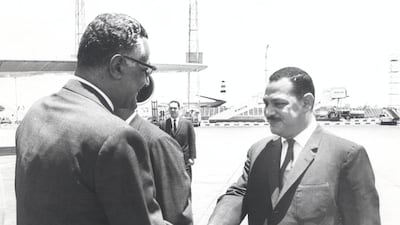Sami Sharaf, a confidant of Egypt's late leader Gamal Abdel Nasser, has died. He was 94.
Official media reports said Sharaf died on Monday of an unspecified illness that affected him several months ago.
Sharaf's funeral took place on Tuesday at a mosque that sits on the side of Cairo's famous Salah Salem highway, a thoroughfare named after an army officer and a comrade of Abdel Nasser's. The mourners were led by the late leader's son, Abdel Hakim Abdel Nasser.
Born in 1929 in Cairo, Sharaf was one of six children born to an Edinburgh-trained surgeon who died in 1953. Sharaf was a graduate of Egypt's military academy, where he was instructed by Nasser.
He served in the artillery corps before he became one of the founders of Egypt's General Intelligence Directorate after the 1952 revolution that toppled a 150-year-old hereditary monarchy and turned Egypt into a republic that later embraced a socialist ideology.
Sharaf was named an aide to Nasser in 1955 before he became the Egyptian leader's private secretary and close confidante. He was appointed minister for presidential affairs just months before Nasser died in 1970.
Nasser's successor, Anwar Sadat, arrested Sharaf in 1971, along with dozens of other Nasser loyalists, whom he accused of plotting to overthrow his government. Sharaf was sentenced to life in prison but was pardoned in 1981, only months before Sadat was assassinated at a military parade in Cairo.
Sharaf chronicled his years of service as Nasser's secretary in a seven-volume memoir published after Sadat's death. It contained scathing criticism of Sadat's policies, including the shift into an alliance with the US that replaced Cairo's close ties with Moscow during the Nasser years.
He criticised Sadat for dismantling Egypt's state-controlled economy and replacing it with a system that left the poorer people at the mercy of market forces and gave rise to corruption.
Years and Days with Gamal Abdel Nasser confirmed Sharaf's media nickname as "Nasser's black box", a reference to his place at the heart of the Egyptian leader's inner circle.
The book touches on momentous events such as the 1956 Suez crisis and Egypt's stunning 1967 defeat at the hands of Israel.
The memoir, however, has been seen by many as a biased account of the era, casting Nasser in a positive light although in his later years in power, he oversaw Egypt's national and Arab nationalist dreams being crushed by the 1967 defeat.
Mohammed Fayeq, another former director of Nasser's office described Sharaf’s death as “a huge loss for the Nasserist ideology”.
"What distinguished Sharaf the most was his loyalty and faithfulness to his country and Gamal Abdel Nasser," he added.
"He never left his office to go home before making sure that the president had gone to sleep.”

